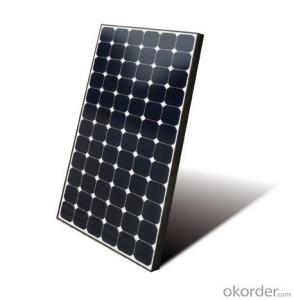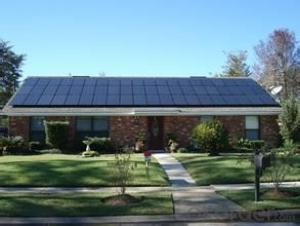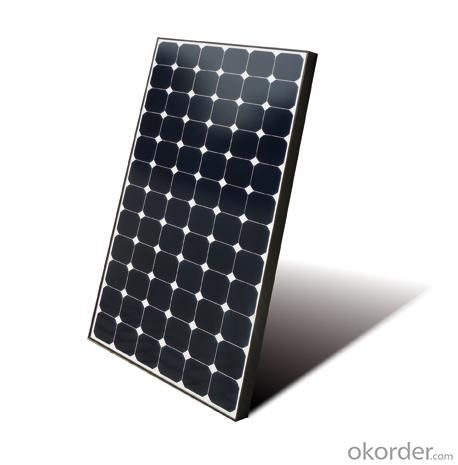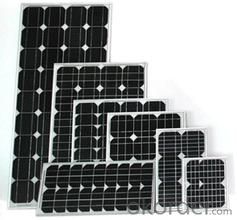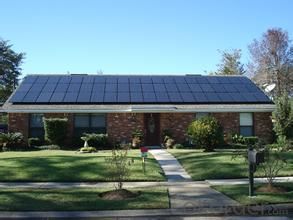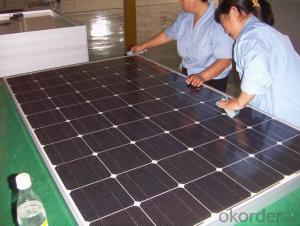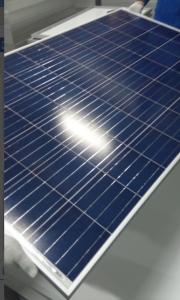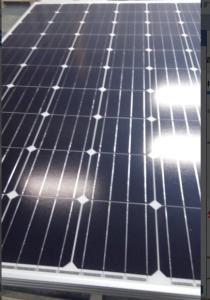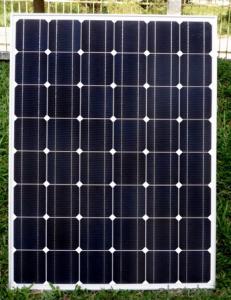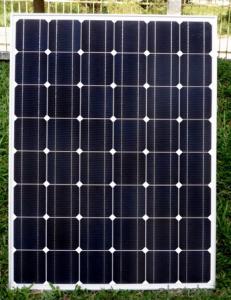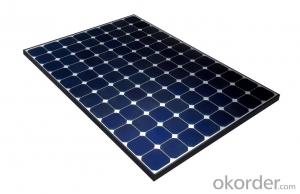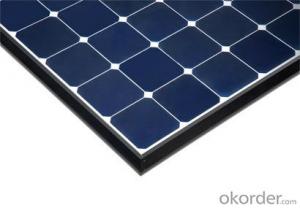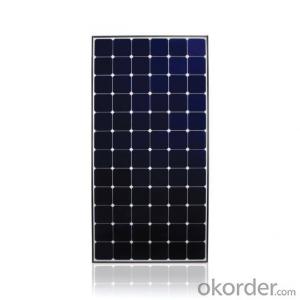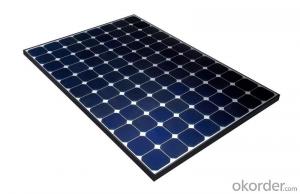Solar Panels 4k - Mono Solar Panel 265W A Grade with Cheapest Price
- Loading Port:
- Shanghai
- Payment Terms:
- TT OR LC
- Min Order Qty:
- 50 watt
- Supply Capability:
- 50000 watt/month
OKorder Service Pledge
OKorder Financial Service
You Might Also Like
Specification
Mono Solar Panel 265W A Grade with Cheapest Price
Product description
60 cell multi-crystalline solar module. 40mm natural anodised frame. IP65 rated Jbox, 1m solar cable and a pair of MC4 connectors.TÜV SÜD,SABS ISO 9001:2008 certified.
There are a few solar panels available that are exceeding 19% efficiency. A single solar module can produce only a limited amount of power; most installations contain multiple modules. A photovoltaic system typically includes a panel or an array of solar modules, a solar inverter, and sometimes a battery and/or solar tracker and interconnection wiring.
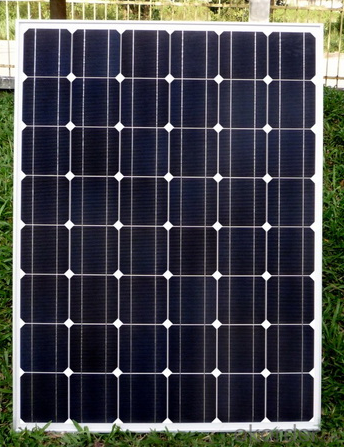
Application
Industrial
Commercial
Residential
Product feather
solar panel refers to a panel designed to absorb the sun's rays as a source of energy for generating electricity or heating.
A photovoltaic (in short PV) module is a packaged, connected assembly of typically 6×10 solar cells. Solar Photovoltaic panels constitute the solar array of a photovoltaic system that generates and supplies solar electricityin commercial and residential applications. Each module is rated by its DC output power under standard test conditions, and typically ranges from 100 to 365 watts. The efficiency of a module determines the area of a module given the same rated output – an 8% efficient 230 watt module will have twice the area of a 16% efficient 230 watt module. There are a few solar panels available that are exceeding 19% efficiency. A single solar module can produce only a limited amount of power; most installations contain multiple modules. A photovoltaic system typically includes a panel or an array of solar modules, a solar inverter, and sometimes a battery and/or solar tracker and interconnection wiring.
Packaging
24-26pcs into carton 312pcs for 20 foot container 712pcs for 40 foot container.
- Q: I have to get a lot of information on how solar panels are developed and distributed in America because I have to do two pages on this. Please help me get information in this I really need it!! Thankss...
- The first link below is one of the best sites for recent news about solar panels. You should be able to find stories about solar panels under development today. A little bit of the history: Solar panels have been around for about 50 years now. They were first used to power spacecraft. Solar power for domestic use started to develop rapidly in the 970's during the first oil crisis, but as energy prices fell in the 980's solar development slowed. Most of the large solar panel makers were purchased by large oil companies who seemed not to be too interested in solar. In the late 990's as concerns about both Peak Oil and Global Warming grew there was renewed interest in solar power and a number of new companies were started to develop new kinds of solar panels. Many of these new companies have grown larger than the older solar companies still owned by big oil companies. Over the last 7 years or so growth in the solar market has been explosive with a compound growth rate of almost 40% per year. In 2005 the solar industry for the first time started to consume more silicon than all other electronic industries combined resulting in a world wide silicon shortage that is still with use. New silicon refineries are coming on line and the shortage is expected to diminish by 2008 or 2009. Check out the two links below. They will help you a lot.
- Q: Does anyone know how I would go about hooking up the air conditioners in my house to solar panels? I would want just the air conditioners to be powered by solar energy. How could I hook it up where the panels can absorb energy from the sun during the day, and save and store the energy so I can run the air conditioners at night? I really feel that in the long run, this would save a lot of money with the energy bill. It's the use of the air conditioners that drive up the bill. Is this idea feasible? Is it also possible to have some sort of hybrid system where I can switch from solar to my regular local energy source when I want to?
- There's no need to connect only the A/C to solar, nor is there a need to use batteries. Both of those problems are solved with grid-tied solar. The solar electricity system works alongside your regular, and the A/C just plugs in normally. You never need to worry about switching. During the day, if the A/C is drawing power, the solar goes into that, reducing your draw from the electric company. If the solar generates more than the A/C needs, the meter is driven backwards. At night, the meter runs forward again. For example, the meter may read 5000 in the morning. By evening, maybe it reads 4975. At night, it creeps back up to 5005. When the meter reader comes, you would be billed for only 5 kWh. That's the general idea. Also, consider whether you can insulate your home more, and whether you might want to change out your air conditioners for new, DC inverter mini-split units. Those can use a fraction of the electricity per BTU of regular air conditioners.
- Q: Can solar panels be installed on a greenhouse?
- Yes, solar panels can be installed on a greenhouse. In fact, it is a common practice to install solar panels on greenhouses to harness solar energy for both power generation and to provide supplemental lighting and heating for the plants inside.
- Q: Can solar panels be used in areas with high temperatures?
- Yes, solar panels can be used in areas with high temperatures. In fact, solar panels are designed to withstand a wide range of temperatures, including high heat. However, it is important to note that excessive heat can slightly reduce the efficiency of solar panels. Therefore, proper installation and regular maintenance are crucial to ensure optimal performance in hot climates.
- Q: Aren't batteries bad for the environment?Toxic?Expensive? With small solar panels phones, iPod's, laptops other small electronics could be smaller, slimmer, more efficient cost people less to charge every day. Maybe a small battery inside as a backup and to store the Solar energy for night time. But overall, batteries should be optional. So big question:Why aren't electronics being produced with solar panels?
- Yes your right, solar panels (photovoltics) could be used to make electricity for small electronics. Right now solar cells are on many calculators, and even flashlight. But the problem is the lenght of time the cells take to charge the device, verses the power demand. I don;t think the size of the panels, and the amount of time needed to charge the device are practical. One think I have been thinking is that every one should have a photovoltaic panel to charge a battery. Then, use the battery to charge cell phones, MP3 palyers. The panel and the battery could be about the 8 x inches, and could sit in window, or on a dash board to get charged, then used in doors over night to charge devices.
- Q: Can solar panels be used to power a hospital?
- Yes, solar panels can be used to power a hospital. Solar panels generate electricity by converting sunlight into energy, which can be used to power various electrical systems in a hospital, such as lighting, medical equipment, and heating/cooling systems. Solar power can provide a reliable and sustainable source of energy for hospitals, reducing their dependence on traditional energy sources and helping to lower operational costs.
- Q: are there solar panel that work without the sun?
- No. Solar literally means Sun. But...scientists are working on a panel that can absorb energy after the sun has set. It may be years until we see any commercial success.
- Q: I want to know how many solar panels to use to power my AC and Water heater
- Solar okorder /
- Q: Can solar panels work at night?
- No, solar panels cannot work at night as they rely on sunlight to generate electricity.
- Q: Can solar panels reduce electricity bills?
- Yes, solar panels can reduce electricity bills. By harnessing the sun's energy to generate electricity, solar panels can offset a significant portion of a household's electricity consumption, leading to lower monthly bills. Additionally, excess energy produced by solar panels can be fed back into the grid, allowing homeowners to earn credits or receive payments from utility companies.
Send your message to us
Solar Panels 4k - Mono Solar Panel 265W A Grade with Cheapest Price
- Loading Port:
- Shanghai
- Payment Terms:
- TT OR LC
- Min Order Qty:
- 50 watt
- Supply Capability:
- 50000 watt/month
OKorder Service Pledge
OKorder Financial Service
Similar products
Hot products
Hot Searches
Related keywords
